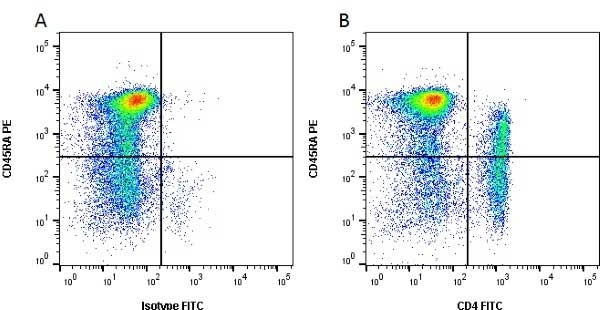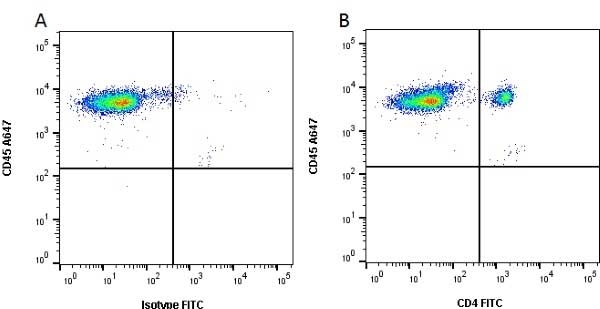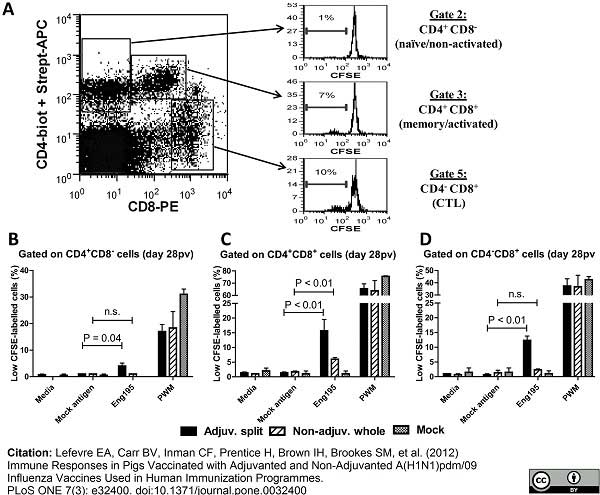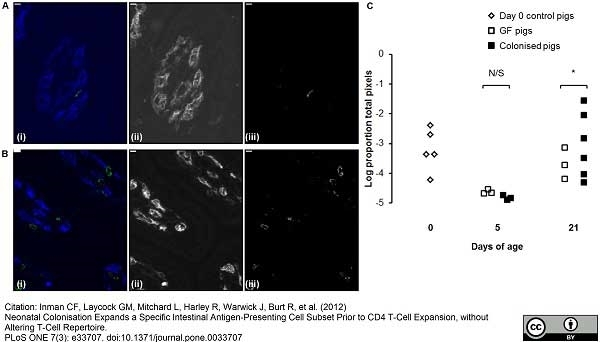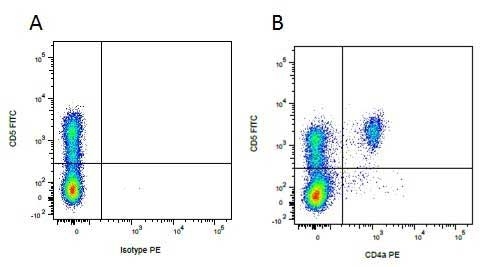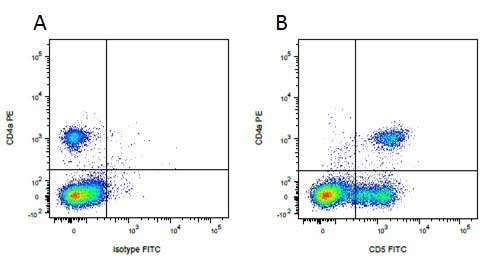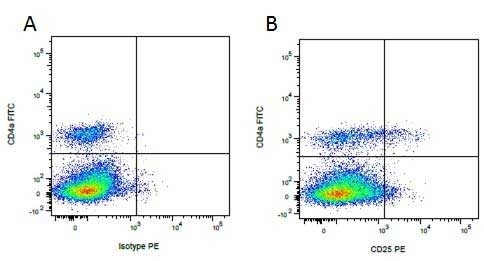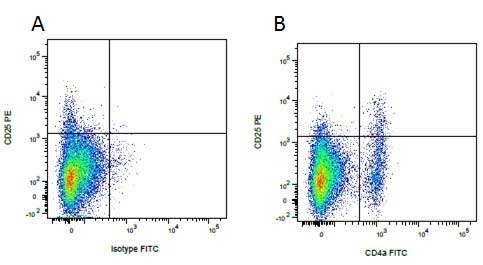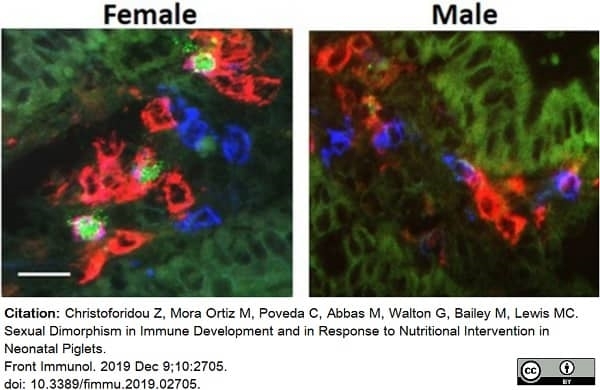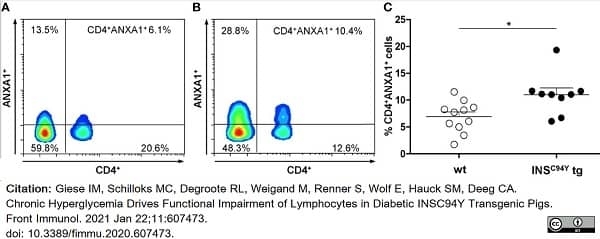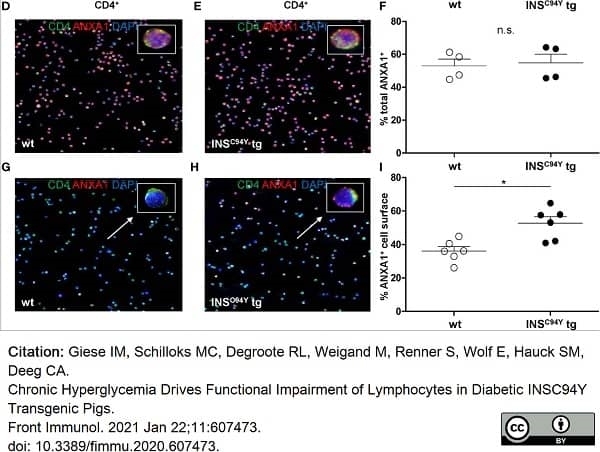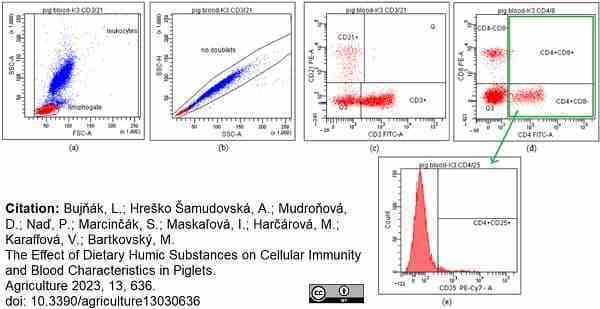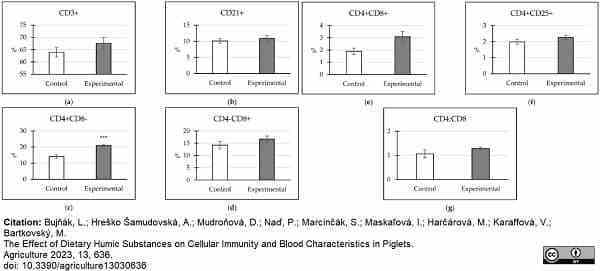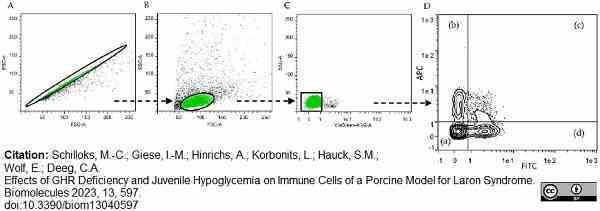CD4 Alpha antibody | MIL17














Mouse anti Pig CD4 Alpha:RPE
- Product Type
- Monoclonal Antibody
- Clone
- MIL17
- Isotype
- IgG2b
- Specificity
- CD4 Alpha
| Mouse anti Porcine CD4 alpha, clone MIL17 recognizes a ~55 kDa porcine homologue to the human CD4 antigen found on the surface of helper-T cells. MIL-17 was confirmed as a member of the CD4 alpha cluster at the ‘Third International Workshop on Swine Leukocyte Differentiation Antigens’ (Haverson et al. 2001). Porcine CD4 is a type 1 trans-membrane member of the immunoglobulin superfamily. Pigs appear unusual amongst mammalian species as they appear to have four populations of resting T lymphocytes. In addition to the two populations of mutually exclusive CD4+/CD8- and CD4-/CD8+ lymphocytes, they also appear to have significant populations of CD4-/CD8- and CD4+/CD8+ cells. Lymphoblasts with a double positive phenotype have been described in other species but this is not the case for mature T lymphocytic calls (Saalmuller et al. 1987) Mouse anti Pig CD4 alpha, clone MIL17 stains a population of cells with characteristic lymphocyte morphology in immunohistochemistry ( |
- Target Species
- Pig
- Product Form
- Purified IgG conjugated to R. Phycoerythrin (RPE) - lyophilized
- Reconstitution
- Reconstitute with 1.0 ml distilled water
- Preparation
- Purified IgG prepared by affinity chromatography on Protein A from tissue culture supernatant
- Buffer Solution
- Phosphate buffered saline
- Preservative Stabilisers
- 0.09% sodium azide (NaN3)
1% bovine serum albumin
5% sucrose - Immunogen
- Leucocytes isolated from porcine gut lamina propria.
- Max Ex/Em
-
Fluorophore Excitation Max (nm) Emission Max (nm) RPE 488nm laser 496 578 - Regulatory
- For research purposes only
- Guarantee
- 12 months from date of despatch
DO NOT FREEZE.
This product should be stored undiluted. This product is photosensitive and should be protected from light. Should this product contain a precipitate we recommend microcentrifugation before use.
| Application Name | Verified | Min Dilution | Max Dilution |
|---|---|---|---|
| Flow Cytometry | Neat |
- Flow Cytometry
- Use 10μl of the suggested working dilution to label 106 cells in 100μl
How to Use the Spectraviewer
Watch the Tool Tutorial Video ▸- Start by selecting the application you are interested in, with the option to select an instrument from the drop down menu or create a customized instrument
- Select the fluorophores or fluorescent proteins you want to include in your panel to check compatibility
- Select the lasers and filters you wish to include
- Select combined or multi-laser view to visualize the spectra
| Description | Product Code | Applications | Pack Size | List Price | Your Price | Quantity | |
|---|---|---|---|---|---|---|---|
| Mouse IgG2b Negative Control:RPE | MCA691PE | F | 100 Tests | Log in | |||
| List Price | Your Price | ||||||
| Log in | |||||||
| Description | Mouse IgG2b Negative Control:RPE | ||||||
References for CD4 Alpha antibody
-
Saalmüller A et al. (2001) Summary of workshop findings for porcine T-lymphocyte-specific monoclonal antibodies.
Vet Immunol Immunopathol. 80 (1-2): 35-52. -
Castellano, G. et al. (2010) Therapeutic targeting of classical and lectin pathways of complement protects from ischemia-reperfusion-induced renal damage.
Am J Pathol. 176: 1648-59. -
Inman, C.F. et al. (2010) Dendritic cells interact with CD4 T cells in intestinal mucosa.
J Leukoc Biol. 88 (3): 571-8. -
Kick, A.R. et al. (2011) Evaluation of peripheral lymphocytes after weaning and vaccination for Mycoplasma hyopneumoniae.
Res Vet Sci. 91 (3): e68-72. -
Kick, A.R. et al. (2012) Effects of stress associated with weaning on the adaptive immune system in pigs.
J Anim Sci. 90: 649-56. -
Goujon, J.M. et al. (2000) Influence of cold-storage conditions on renal function of autotransplanted large pig kidneys.
Kidney Int. 58: 838-50. -
Tambuyzer BR et al. (2012) Osteopontin alters the functional profile of porcine microglia in vitro.
Cell Biol Int. 36 (12): 1233-8. -
Tuchscherer, M. et al. (2012) Effects of inadequate maternal dietary protein:carbohydrate ratios during pregnancy on offspring immunity in pigs.
BMC Vet Res. 8: 232.
View The Latest Product References
-
Cao, D. et al. (2010) Synthetic innate defence regulator peptide enhances in vivo immunostimulatory effects of CpG-ODN in newborn piglets.
Vaccine. 28: 6006-13. -
Clapperton, M. et al. (2005) Associations of weight gain and food intake with leukocyte sub-sets in Large White pigs
Livestock Production Science 96: 249-60 -
Clapperton, M. et al. (2005) Innate immune traits differ between Meishan and Large White pigs.
Vet Immunol Immunopathol. 104: 131-44. -
Clapperton, M. et al. (2008) Pig peripheral blood mononuclear leucocyte subsets are heritable and genetically correlated with performance.
Animal. 2: 1575-84. -
Faure, J.P. et al. (2002) Polyethylene glycol reduces early and long-term cold ischemia-reperfusion and renal medulla injury.
J Pharmacol Exp Ther. 2002 Sep;302(3):861-70. -
Faure, J.P. et al. (2004) Evidence for protective roles of polyethylene glycol plus high sodium solution and trimetazidine against consequences of renal medulla ischaemia during cold preservation and reperfusion in a pig kidney model.
Nephrol Dial Transplant. 19: 1742-51. -
Inman, C.F. et al. (2012) Neonatal colonisation expands a specific intestinal antigen-presenting cell subset prior to CD4 T-cell expansion, without altering T-cell repertoire.
PLoS One. 7(3): e33707. -
Langerhuus, S.N. et al. (2010) Brief report: biomarkers of aortic vascular prosthetic graft infection in a porcine model with Staphylococcus aureus.
Eur J Clin Microbiol Infect Dis. 29: 1453-6. -
Lu, X. et al. (2012) Genome-wide association study for T lymphocyte subpopulations in swine.
BMC Genomics. 13: 488. -
Monroy-Salazar, H.G. et al. (2012) Effects of a live yeast dietary supplement on fecal coliform counts and on peripheral blood CD4+ and CD8+ lymphocyte subpopulations in nursery pigs.
J Swine Health Prod 20: 276-282. -
Shi, K. et al. (2008) Changes in peripheral blood leukocyte subpopulations in piglets co-infected experimentally with porcine reproductive and respiratory syndrome virus and porcine circovirus type 2.
Vet Microbiol. 129: 367-77. -
Spreeuwenberg, M.A. et al. (2001) Small intestine epithelial barrier function is compromised in pigs with low feed intake at weaning.
J Nutr. 131: 1520-7. -
Zelnickova, P. et al. (2007) Intracellular cytokine detection by flow cytometry in pigs: fixation, permeabilization and cell surface staining.
J Immunol Methods. 327: 18-29. -
Lefevre, E.A. et al. (2012) Immune responses in pigs vaccinated with adjuvanted and non-adjuvanted A(H1N1)pdm/09 influenza vaccines used in human immunization programmes.
PLoS One. 7(3): e32400. -
Akershoek, J.J. et al. (2016) Cell therapy for full-thickness wounds: are fetal dermal cells a potential source?
Cell Tissue Res. 364 (1): 83-94. -
Liu J et al. (2016) The Role of Porcine Monocyte Derived Dendritic Cells (MoDC) in the Inflammation Storm Caused by Streptococcus suis Serotype 2 Infection.
PLoS One. 11 (3): e0151256. -
Liermann, W. et al. (2017) Effects of two commercial diets and technical feed treatment on stomach lesions and immune system of fattening pigs.
J Anim Physiol Anim Nutr (Berl). 101 (5): e414-26. -
Gardner, D.S. et al. (2016) Remote effects of acute kidney injury in a porcine model.
Am J Physiol Renal Physiol. 310 (4): F259-71. -
Hemmink, J.D. et al. (2016) Distinct immune responses and virus shedding in pigs following aerosol, intra-nasal and contact infection with pandemic swine influenza A virus, A(H1N1)09.
Vet Res. 47 (1): 103. -
Dąbrowski, M. et al. (2017) The Effect of Deoxynivalenol on Selected Populations of Immunocompetent Cells in Porcine Blood-A Preliminary Study.
Molecules. 22 (5): 691. -
Hsu, W.T. et al. (2013) Prostaglandin E2 potentiates mesenchymal stem cell-induced IL-10+IFN-γ+CD4+ regulatory T cells to control transplant arteriosclerosis.
J Immunol. 190 (5): 2372-80. -
Matsubara, T. et al. (2015) Identification of a CD4 variant in Microminipigs not detectable with available anti-CD4 monoclonal antibodies.
Vet Immunol Immunopathol. 168 (3-4): 176-83. -
Hu, Z. et al. (2019) Genomic variant in porcine TNFRSF1A gene and its effects on TNF signaling pathway in vitro.
Gene. 700: 105-9. -
Fogle, J.E. et al. (2019) Antibiotic Therapy Does Not Alter the Humoral Response to Vaccination for Porcine Circovirus 2 in Weaned Pigs.
Vet Sci. 6(2): 51. -
Forner, R. et al. (2021) Distribution difference of colostrum-derived B and T cells subsets in gilts and sows.
PLoS One. 16 (5): e0249366. -
Christoforidou, Z. et al. (2019) Sexual Dimorphism in Immune Development and in Response to Nutritional Intervention in Neonatal Piglets.
Front Immunol. 10: 2705. -
López, E. et al. (2019) Identification of very early inflammatory markers in a porcine myocardial infarction model.
BMC Vet Res. 15 (1): 91. -
Liu, K.Y. et al. (2021) Fallopian tube stem cell medium of porcine and bovine: In vitro. regenerative effect on maturation and parthenogenesis of porcine oocytes.
Res Vet Sci. 140: 83-90. -
Giese, I.M. et al. (2020) Chronic Hyperglycemia Drives Functional Impairment of Lymphocytes in Diabetic INS C94Y Transgenic Pigs.
Front Immunol. 11: 607473. -
Nielsen, O.L. et al. (2022) A porcine model of subcutaneous Staphylococcus aureus infection: a pilot study.
APMIS. 130 (7): 359-70. -
Maciag, S.S. et al. (2022) On the influence of the source of porcine colostrum in the development of early immune ontogeny in piglets.
Sci Rep. 12 (1): 15630. -
Melgoza-González, A.E. et al. (2022) Antigen Targeting of Porcine Skin DEC205+ Dendritic Cells
Vaccines. 10 (5): 684. -
Zhou, L. et al. (2022) Clinical improvement of sepsis by extracorporeal centrifugal leukocyte apheresis in a porcine model.
J Transl Med. 20 (1): 538. -
Wu, M.C. et al. (2023) A protein-based subunit vaccine with biological adjuvants provides effective protection against Pasteurella multocida in pigs.
Vet Res. 54 (1): 17. -
Bujňák, L. et al. (2023) The Effect of Dietary Humic Substances on Cellular Immunity and Blood Characteristics in Piglets
Agriculture. 13 (3): 636. -
Schilloks, M.C. et al. (2023) Effects of GHR Deficiency and Juvenile Hypoglycemia on Immune Cells of a Porcine Model for Laron Syndrome.
Biomolecules. 13 (4): 597. -
Haach, V. et al. (2023) A polyvalent virosomal influenza vaccine induces broad cellular and humoral immunity in pigs.
Virol J. 20 (1): 181.
Further Reading
-
Piriou-Guzylack, L. (2008) Membrane markers of the immune cells in swine: an update.
Vet Res. 39: 54.
- Synonyms
- CD4
- RRID
- AB_323455
MCA1749PE
If you cannot find the batch/lot you are looking for please contact our technical support team for assistance.
Please Note: All Products are "FOR RESEARCH PURPOSES ONLY"
View all Anti-Pig ProductsAlways be the first to know.
When we launch new products and resources to help you achieve more in the lab.
Yes, sign me up